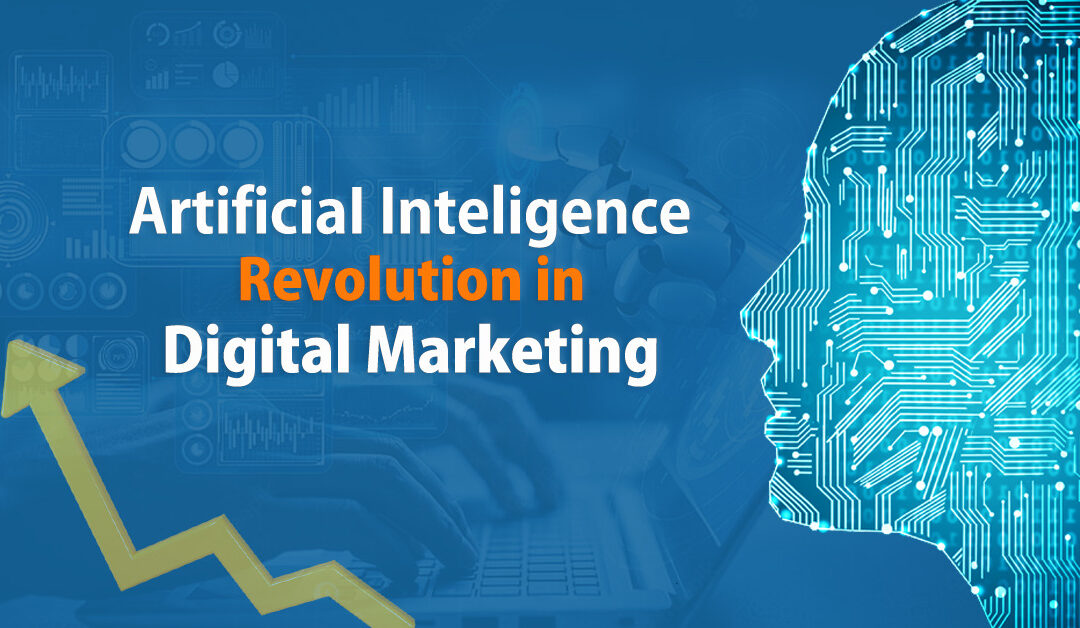
Unlocking Opportunities: AI’s Role in Local SEO for 2024
In the always-changing online world, small businesses are using Artificial Intelligence (AI) to change how they show up in local searches. It’s not just about using specific words or links anymore. Now, AI is like a game-changer, creating new chances and breaking old rules. In this detailed look, we explore all the different ways AI is changing local SEO for small businesses. It helps them be seen more, brings in the right customers, and makes sure people stay interested. AI is like a digital superhero for small businesses, making their online presence stronger and more appealing to the people looking for them.
1. Understanding AI in SEO
AI is not just in stories; it’s real and changing how SEO works. It’s like a helpful friend in the digital world, making things better. Let’s see how AI is making a big difference in how we search and find things online:
(a) Shift from Keywords to User Intent
In the past, web content was saturated with keywords, but AI algorithms like Google’s RankBrain have transformed the approach. They prioritize understanding user intent over mindless keyword repetition, emphasizing context and relevance. RankBrain reads between the lines of user queries, delivering results that align with genuine user needs. Today, content optimization focuses on crafting contextually relevant material that meets the dynamic needs of users, marking a shift from keyword-centric strategies to a more intelligent, user-oriented approach.
(b) Personalization and Predictive Analysis
AI makes things personal on the internet. It looks at what you do online, guesses what you might search for next, and shows you results designed just for you. This is super useful for small businesses because it helps them connect better with the people who might be interested in what they offer. AI makes sure the online experience feels special for each person, making it more likely they’ll stick around and become regular customers. It’s like having a friendly guide in the online world, making everything feel just right for you.
(c) Machine Learning and SEO
Think of Machine Learning (ML) as the brain behind the scenes in the world of online search. ML, a part of Artificial Intelligence, learns from what people do online. It gets better at showing search results and suggesting things based on what each person likes. It’s like a clever assistant that keeps learning and understanding what you want, making your online experience smoother and more personal. In SEO, this means it helps you find what you’re looking for and recommends stuff you might like, creating a friendlier and more helpful online world.
2. AI in Local SEO
AI transforms local SEO, changing it from a broad approach to a precise one. Instead of reaching everyone randomly, it helps businesses aim directly at the right audience, like a skilled sniper. AI studies lots of data, finding patterns to improve strategies. This means small businesses can connect with nearby people more effectively. It’s like having a super-smart assistant that knows exactly how to reach the right customers. Thanks to AI, businesses can now target their local audience more accurately, making it easier to succeed in their communities. It’s like a digital magic wand, making everything work perfectly for them.
(b) Automating Repetitive Tasks
AI is a game-changer in SEO, handling repetitive tasks to save time for business owners. Whether it’s tracking rankings or updating listings, AI streamlines processes, letting small businesses concentrate on growth. Automated SEO tasks mean less manual work, more efficiency, and better results. It’s like having a reliable assistant that takes care of the routine stuff, leaving business owners with more time to make their ventures thrive. With AI on board, small businesses can boost productivity and stay competitive in the digital landscape. It’s not just about saving time; it’s about using smart technology to supercharge growth and make things easier for busy entrepreneurs. AI is the key to unlocking efficiency and success in the world of SEO for small businesses.
(c) Deep Backlink Analysis
Backlinks are essential for SEO success. AI tools examine backlink profiles, pinpoint high-quality links, and assist businesses in forming authoritative connections. It’s akin to having an SEO detective uncovering valuable opportunities. By utilizing AI, businesses can enhance their online presence through strategic link building, ultimately boosting their website’s credibility and visibility in search engine results. These AI-powered tools streamline the process of identifying and acquiring valuable backlinks, saving time and effort for businesses. With the help of AI, businesses can navigate the complex landscape of backlink analysis with ease, ensuring that their SEO efforts are targeted and effective.
(d) AI-assisted Website Design
User experience is a big deal, and AI-driven website design makes it top-notch. With optimal layouts, speedy load times, and smooth navigation, small businesses can create sites that visitors love. AI ensures websites are user-friendly, keeping people engaged and happy. The technology takes care of the design details, making sure everything looks good and works well. For small businesses, this means more satisfied visitors, which can boost their online presence. Plus, search engines love user-friendly sites, so it’s a win-win. Thanks to AI, small businesses can have websites that not only look great but also provide a seamless and enjoyable experience for anyone who drops by. It’s like having a tech-savvy designer ensuring your website is always at its best.
(e) Customer Support with Chatbots
AI-driven chatbots elevate customer support by delivering instant responses, addressing inquiries, and enhancing overall user satisfaction. This translates to 24/7 availability for small businesses without the need for additional staff. These smart chatbots not only provide quick solutions but also create a seamless experience for users, ensuring their needs are met promptly. For small businesses, the advantage is clear – efficient and constant customer support without the associated costs of hiring and maintaining a round-the-clock team. With AI-powered chatbots in action, businesses can scale their customer service effortlessly, offering timely assistance and improving customer interactions. The result is not just satisfied customers but also a positive impact on the business’s online reputation and search engine visibility. AI-driven chatbots are the modern solution for small businesses seeking to provide exceptional customer support while optimizing operational costs.
(f) Feedback and Review Automation
AI tools keep a close eye on online reviews, spotting trends and nudging businesses to respond. Positive reviews enhance credibility, while addressing negative feedback shows responsiveness. With AI, businesses stay on top of their online reputation game. These smart tools not only track what people are saying but also guide businesses in managing their image effectively. For SEO, a positive online reputation is gold. It builds trust with customers and signals search engines that the business is reliable. AI ensures that businesses don’t miss a beat when it comes to online reviews, allowing them to maintain a positive image and make the most of their SEO efforts. It’s like having a reputation manager always looking out for the business’s online standing
3. Seizing the Opportunities
Small businesses, often considered challengers, are at the forefront of this AI revolution. By embracing AI, they can level the playing field, enhance their digital presence, and drive sustainable growth in local markets. As we navigate this uncharted territory, let AI be our compass, guiding us toward a future where local SEO is smarter, more personalized, and more effective than ever before. Call or WhatsApp us at +91 9903254972, BD-Zed Computer is one of the best digital marketing companies in India, providing top-notch services to empower businesses in the digital age. Let’s embark on this journey together and unlock the full potential of AI-driven local SEO for your business.
Implementing AI in Your Local Business: A Step-by-Step Guide
As a small business owner, incorporating Artificial Intelligence (AI) into your operations has the potential to be a transformative game-changer. In this in-depth guide, we’ll take you through a step-by-step process, providing insights and actionable steps to help you harness the power of AI for sustainable growth.
1. Grasping the Basics: AI vs. ML
Before diving into the AI realm, it’s crucial to understand the basics. Differentiate between Artificial Intelligence (AI), which simulates human intelligence, and Machine Learning (ML), a subset of AI that learns from data. Knowing these distinctions lays the foundation for informed decision-making.
2. Defining Business Needs
Identifying the areas where AI can make a significant impact is the next step. Consider the following applications tailored to small businesses:
a. Customer Service Enhancement
Leverage AI-powered chatbots to handle inquiries, improve response times, and enhance overall customer satisfaction. These automated assistants can provide immediate assistance, ensuring a positive interaction for your clients.
b. Trend Analysis for Strategic Adaptation
Utilize AI to analyze trends in your industry and adapt your offerings accordingly. This proactive approach allows your business to stay ahead of the curve, adjusting strategies based on emerging patterns identified by AI algorithms.
3. Prioritizing Value Drivers
When integrating AI, focus on what matters most to your business:
a. Return on Investment (ROI)
Prioritize AI initiatives that offer substantial returns. Identify areas where AI can optimize processes, reduce costs, or enhance revenue generation. A targeted approach ensures efficient resource allocation.
b. Customer Experience Enhancement
Direct AI efforts towards enhancing customer experiences. Implement solutions that personalize interactions, improving engagement and loyalty. AI can analyze customer behavior to tailor services, creating a more satisfying experience.
4. Evaluating Internal Capabilities
Assess your team’s skills and available resources to facilitate a seamless integration:
a. Employee Training
Invest in AI education for your employees. Equip them with the necessary skills to understand and utilize AI tools effectively. A well-trained team is essential for maximizing the benefits of AI implementation.
b. Data Infrastructure Readiness
Ensure your data infrastructure is ready for AI applications. Guarantee the availability and quality of data, as accurate information is paramount for the success of AI algorithms.
5. Seeking Expert Advice from Domain Specialists
Collaborate with experts who possess industry-specific knowledge:
a. Industry-Specific Guidance
Domain specialists can provide valuable insights into how AI can be implemented to address industry-specific challenges and opportunities. Their expertise ensures a tailored approach aligned with your business’s unique needs.
6. Preparing Your Data
Quality data is the backbone of successful AI implementation:
a. Clean and Organize Data
Ensure your data is clean, organized, and ready for AI algorithms. Well-prepared data is essential for accurate analyses and predictions.
b. Data Privacy Compliance
Adhere to data privacy regulations to safeguard sensitive information. Complying with privacy standards is not only ethical but also essential for maintaining trust with your customers.
7. Starting Small with Pilot Programs
Embark on your AI journey with manageable projects:
a. Pilot Programs
Test AI solutions on a small scale through pilot programs. This approach allows you to gauge their effectiveness in a controlled environment, minimizing potential risks.
b. Learn and Adapt
Iterate based on feedback received during pilot programs. Learning from initial implementations enables you to adapt strategies, ensuring continuous improvement.
In conclusion, integrating AI into your small business operations is a strategic move with immense potential for growth. By following this step-by-step guide, you can navigate the complexities of AI implementation, unlock its transformative benefits, and position your business for sustained success in an ever-evolving digital landscape. For personalized guidance on implementing AI in your business, reach out to us or WhatsApp us at +91 9903254972, BD-Zed Computer is one of the best digital marketing companies in India, providing top-notch services to empower businesses in the digital age. Let’s embark on this journey together and unlock the full potential of AI-driven local SEO for your business.
Here are some powerful AI tools that can significantly benefit small businesses:
- Chatbot:
- Purpose: Revolutionize customer interactions.
- Features: Multi-channel support (Website, Facebook, WhatsApp, etc.), Natural Language Processing (NLP), and integration with popular platforms.
- Pros: Customizable workflows, analytics for performance tracking.
- Cons: Advanced customization may require technical expertise.
- Pricing:
- Free: Limited features for basic chatbots.
- Pro: $49/month for more advanced features.
- Business: $99/month with additional integrations and analytics.
- Zoho Analytics:
- Purpose: Powerful data analytics for small businesses.
- Features: Data visualization, reporting tools, integration with various data sources, and collaboration capabilities.
- Pros: User-friendly interface, affordable pricing.
- Cons: Limited native connectors for certain data sources.
- HubSpot Marketing Hub:
- Purpose: Streamline marketing efforts.
- Features: Marketing automation, lead management, and analytics.
- Pros: Comprehensive marketing tools.
- Cons: Pricing may be higher for advanced features.
- QuickBooks Commerce:
- Purpose: Manage inventory and sales.
- Features: Inventory tracking, order management, and reporting.
- Pros: Simplifies e-commerce operations.
- Cons: Pricing tiers based on business size.
- Zendesk:
- Purpose: Enhance customer support.
- Features: Ticketing system, live chat, and knowledge base.
- Pros: Efficient customer service management.
- Cons: Pricing can be steep for larger teams.
- Xero:
- Purpose: Financial management and accounting.
- Features: Invoicing, expense tracking, and bank reconciliation.
- Pros: Cloud-based, user-friendly.
- Cons: May lack some advanced accounting features.
- Salesforce Einstein:
- Purpose: AI-driven CRM.
- Features: Predictive analytics, lead scoring, and personalized recommendations.
- Pros: Integrates seamlessly with Salesforce.
- Cons: Requires familiarity with Salesforce ecosystem.
- Mailchimp:
- Purpose: Email marketing and automation.
- Features: Campaign management, audience segmentation, and reporting.
- Pros: Widely used, beginner-friendly.
- Cons: Pricing tiers based on subscriber count.
- Google Cloud AI Platform:
- Purpose: Custom machine learning models.
- Features: Scalable infrastructure, model training, and deployment.
- Pros: Google’s robust AI capabilities.
- Cons: Requires technical expertise.
- Trello:
- Purpose: Project management and collaboration.
- Features: Kanban boards, task tracking, and team collaboration.
- Pros: Simple interface, adaptable for various workflows.
- Cons: May lack advanced project management features.
Remember, each business has unique needs, so choose the tools that align with your specific goals and budget. These AI solutions can empower your small business to compete effectively in today’s dynamic market. Call or WhatsApp us at +91 9903254972, BD-Zed Computer is one of the best digital marketing companies in India, providing top-notch services to empower businesses in the digital age. Let’s embark on this journey together and unlock the full potential of AI-driven local SEO for your business.


Jay Narayan Maurya
Meet Jay Narayan Maurya, a Google Certified Digital Marketer with over 15+ years of experience. Renowned as a digital marketing trainer, AI expert, web and graphics designer, video editor, and SEO specialist, Jay boasts a dedicated following of 20,000+ at LinkedIn. Beyond his freelancing success, Jay is an author of “Redefining digital marketing with artificial intelligence” . With a unique blend of skills and a passion for innovation, he stands at the forefront of the industry. Join Jay on a transformative journey as he shares insights, techniques, and the latest trends, redefining the landscape of digital marketing for professionals and enthusiasts alike.






















